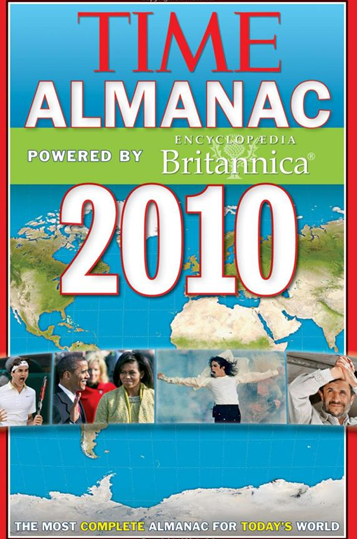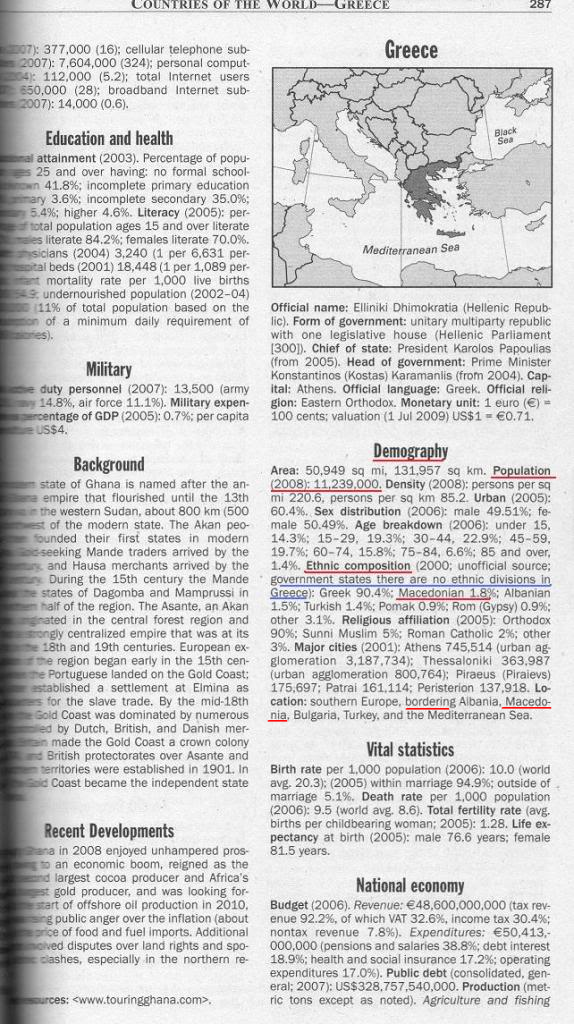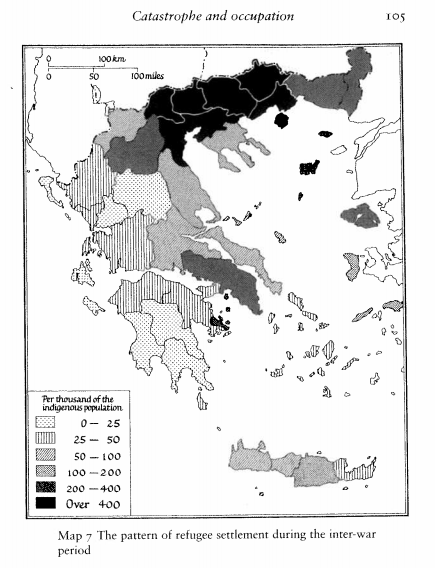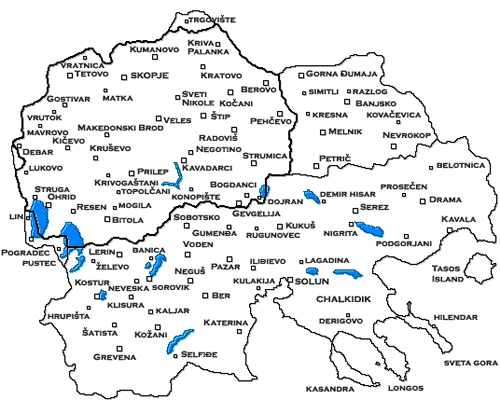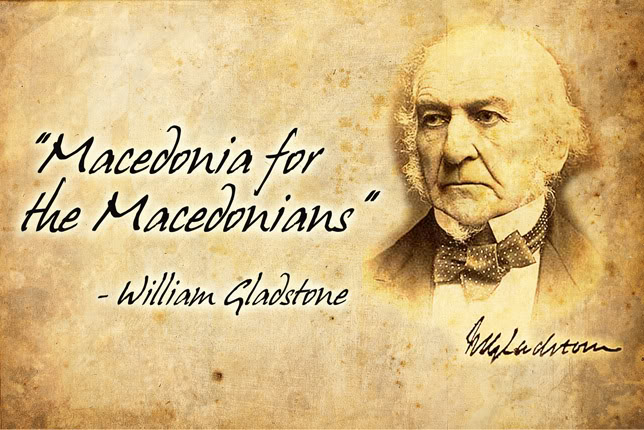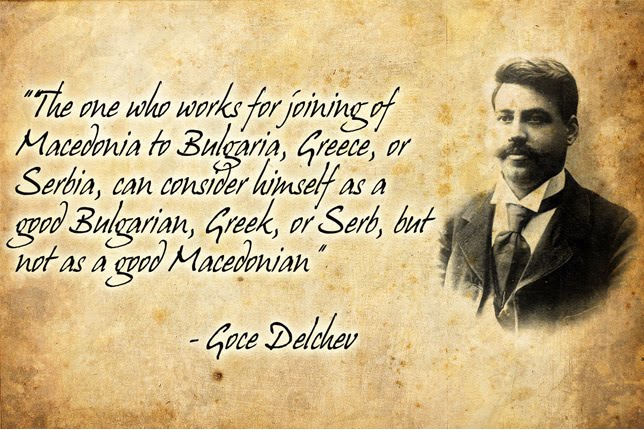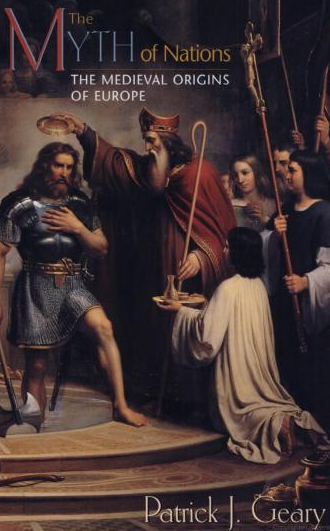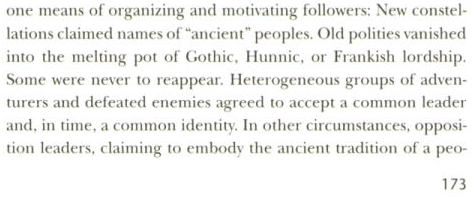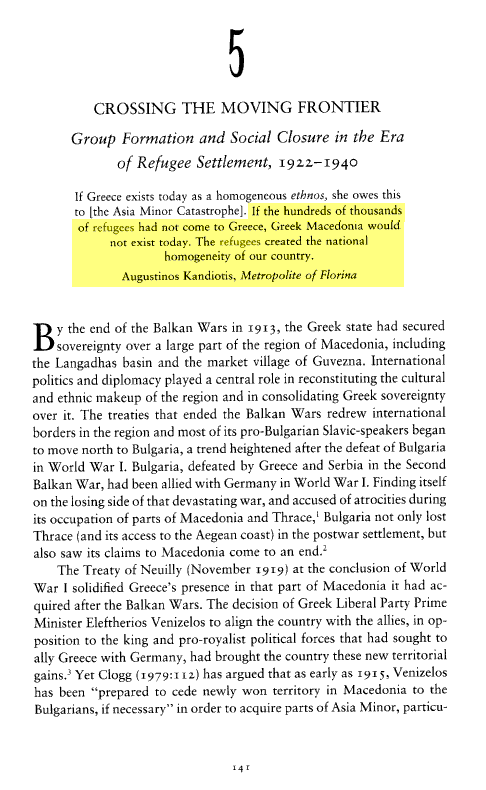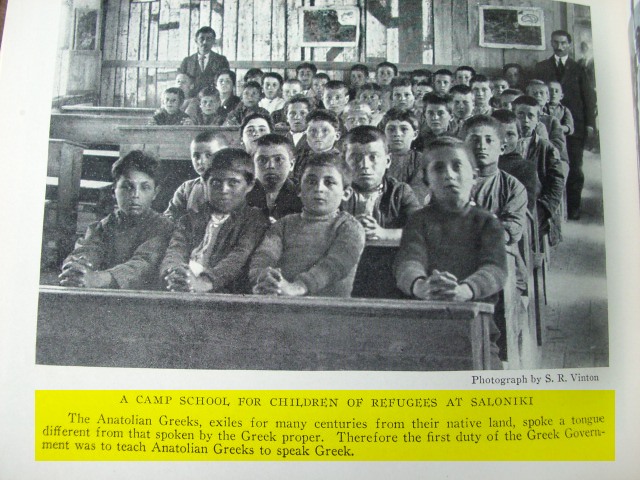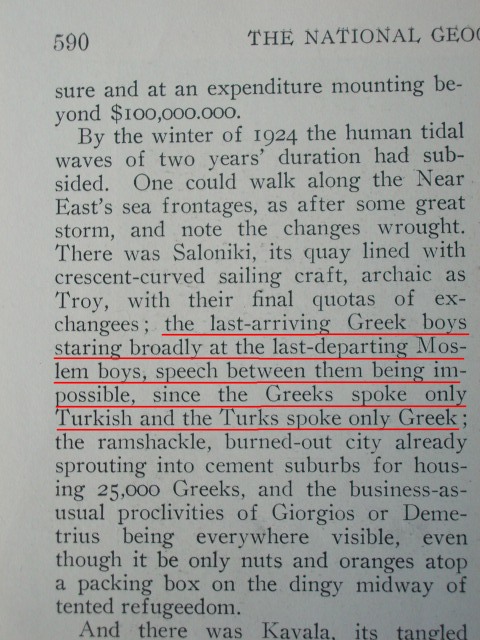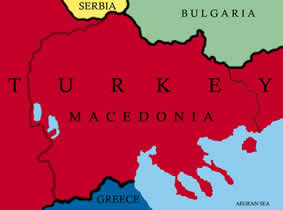Macedonian Lexicon - 16th Century
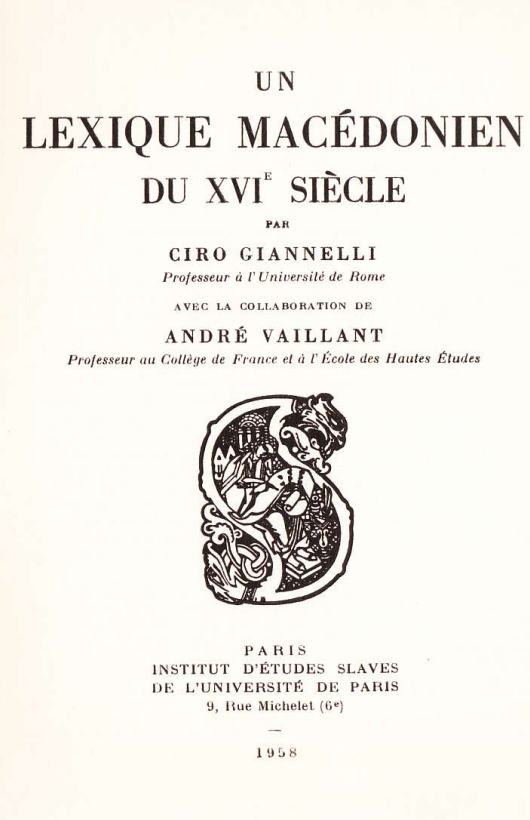 Record of the Macedonian language
Record of the Macedonian language
The texts presented for analysis in this article were produced by the
Institut Detudes Slave, De L’universite De Paris in 1958, and are a study based on words and phrases from Macedonia in the 16th century. It is one of the earliest manuscripts written in a purely Macedonian vernacular tongue, and its content was collected from the village of Bogatsko, which is found in the region of Kostur in the south-west of Macedonia. The author remains anonymous and the only likely conclusion that can be drawn is that he may have spoken the Macedonian language natively or acquired it as an additional tongue due to living in close proximity to people who spoke it. The texts were written using the Greek alphabet, which was not uncommon in the Balkans during the Ottoman period, as similar examples with the Albanian and Vlach languages have demonstrated. Furthermore, the ‘Bulgarian’ label that was at times attached to the Macedonian language is employed in the texts, remnant terminology that had remained in use largely due to Macedonia’s former location within the Bulgarian Empire. Despite this, however, there can be no doubt that the dialect (and indeed location) of Bogatsko belongs to Macedonia, and not Bulgaria.
Macedonia during the Middle Ages
By the end of the 14th century, Macedonia had already been under Ottoman rule for a few decades, losing its status as a vassal state under the leadership of King Marko in 1395. As the greater region was finally deprived of any sense of liberty after the death of George Kastriot - Skenderbeg in 1444, forms of local state structure in Macedonia ceased to exist. This left the responsibility of retaining the culture, language and identity of the people with the religious institutions that were active in Macedonia at that time. The traditional influence of the Patriarchate at Constantinople that was prevalent during the Roman period had resurfaced again in the Ottoman Empire, as the latter looked to use the former to consolidate a single Roman Millet of Orthodox Christians within their domains. However, institutions such as the Archbishopric of Ohrid and even more significantly the hundreds of churches in Macedonia, played a pivotal role in ensuring the local culture, language and identity of the people would survive throughout the centuries of hardships.
Despite the absence of written works relating to statehood, material of a religious and educational character continued to flourish, and Church Slavonic, an essentially Macedonian tongue that was initially developed for such purposes in the 9th century, remained the literary language of the Macedonian people. However, the vernacular tongue of the Macedonians had co-existed with Church Slavonic and matured over the years, demonstrating a remarkable resilience and stability, which earned its introduced as the language of church services in Macedonia. The Macedonians were faced with foreign interference in both their lands and institutions, but their language had been largely solidified, evidenced in the fact that spoken Macedonian from the 16th century has a far greater affinity to spoken Macedonian dialects of today than it does to Church Slavonic. For well over half of a millenium, the Macedonian language has basically remained the same.
Vocabulary and Linguistic Characteristics
The texts reveal distinctive local features that have tenaciously survived the ages, and are still present in a number of today’s spoken Macedonian dialects. This fact reveals the remarkable consistency of the Macedonian language despite the lack of state support or schooling until the 20th century. Below is a sample of words from the texts, along with linguistic characteristics peculiar to the language of the Macedonians.
Animal/Food/Anatomy Terms - Mrave (Ants); Curvec (Worm), Sokol (Falcon), Vrapci (Birds), Golobi (Pigeons), Kokoshki (Chickens), Petel (Rooster), Ofci (Sheep), Kozi (Goats), Jagne (Lamb), Mechika (Bear), Elen (Deer), Lisica (Fox), Kon (Horse), Krusha (Pear), Meso (Meat), Sireni (Cheese), Jajca (Eggs), Vino (Wine), Sol (Salt), Zhito (Grain), Koska (Bone), Gas (Buttocks), Kuro (Penis), Made (Testicles).
Unique and Loan Words - The word Galuhci (Mice) is used, which can also be said as Gluhci or Glufci, and Macedonians are the only people who use this word. The word Veligden (Easter) is used, pronounced with the ‘g’ in Macedonian only. Turkish loans are very rare, one example being Jorgano (Blanket).
Dialectal and Jat Features - The Kostur region contains dialects that have retain several archaic characteristics, such as the word Ranka (Hand) rather than the more common Macedonian variant of Raka. An interesting trend is found in the use of multiple transitions of the
Jat feature that is present in various Macedonian and Slavonic dialects. For example, the text employs the word Dedo (Grandfather) and not Djado, yet Hljap (Bread) and not Lep or Leb.
Definite Articles - The typical Macedonian postfixed definite article is exhibited in words such as Krushata (The Pear) and Dushata (The Soul). It is also noted in the word Patot (The Path) for ‘the path’ , although as the case of Jorgano (The Blanket) demonstrates, the ‘t’ at the end can also be dropped, as in several of today’s Macedonian dialects.
Words and Phrases, Unchanged for Centuries.
Containing a rich glossary and in excess of 300 words and phrases, the texts demonstrate the strength of the Macedonian language through preservation. Following is a comparison of sentences between the texts and the Macedonian dialect of Bitola as spoken today.
16th cent., Kostur dialect
21st cent., Bitola dialect
Gospodine, brate, da si zdrav, da si prost, ostavi ni da spime, ela da jame, i da pieme, dol da pojdime, da rabotime.
Gospodine, brate, da si zdrav, da si prost, ostai ne da spiame, ela da jaime, i da piame, dolu da pojdime, da rabotime.
Imate hljap-o da kupime, imate vino da kupime, ot koja strana da pojdime vo Bogasko.
Imate lep da kupime, imate vino da kupime, od koja strana da pojdime vo Bogatsko.
As can be clearly noticed, most of the vocabulary and grammar is identical.
All of the elements that would later be required to rejuvinate the Macedonian people as they were shaking off centuries of subjugation, were present during this period. The language of the people had solidified, a tradition of heraldry and symbolism had developed which incorporated the emblem of a rapant lion and historical figures from Macedonia’s past, and the churches continued preserve the local customs and serve as cultural centres for the population. The significance of all these elements together cannot be overstated, the language of medieval Macedonia is the same as the language of the Macedonians today. Unfortunately, only a small portion of the larger amount of Macedonian literature from the Middle Ages has survived, much of it being looted and destroyed by Greek-speaking officials, clerics and teachers. Nevertheless, Macedonian as a language reached its current form centuries before the creation of the Balkan states in the 19th and 20th centuries.
What was like the ancient Macedonian language?
There are only a certain number of preserved words, and from the current knowledge the structure of the ancient Macedonian can not be fully synthesised. Most of the ancient Macedonian words are different to the ancient Greek language words, however there are a few that are similar. For the words from the ancient Macedonian language that are similar to the ancient Greek language words are believed to be taken on from Greek.19) In fact, this occurrence was and still is characteristic for all languages in the world. In the Macedonian language today terms are adopted from foreign languages mainly where there is no authentic terminology or analogy. For instance: antena (antenna); satelit (satellite); mobilen telefon (mobile/cellular phone); kompjuter (computer) etc. These foreign words are being adapted in accordance with the modern Macedonian phonetic system. This needs to be taken into account when analysing the ancient Macedonian language. The authenticity and the nature of a language can not be possibly determined only by the words that language adopted from another language.
One needs to bear in mind that almost all the preserved ancient Macedonian words reached modern age through their Greek transcript which makes it more difficult to identify their true meaning. It is important that the phenomenon "Interpretato Graeca" is mentioned here, that is greekifying of all the foreign words: nouns, verbs, and especially names. A specific characteristic of this process is adding the suffix "os" or "s" to the foreign words, and this will be discussed later in this paper.
Despite all this, it is very interesting to note that many of the authentic ancient Macedonian words, according to their etymology and pronunciation, have a striking resemblance to the appropriate words used in the modern Macedonian language (and other so called "Slav" languages).
For instance, the word "tshelniku" which translated in English means foremost is a very interesting case. The British historian Hammond mentioned its etymology and said that the word "tshelniku" in the ancient Macedonian language had a meaning of "leader of a group". Hammond says that this word was translated into Greek only in the 14th century as "phylarchos".20)
The word "tshelnik" with completely identical etymology and pronunciation has been registered in the so called "old Slavic language" in Macedonia as early as 11th century! Proof of this is the entry of Byzantine chronicle writer Kekavmen where he described the events surrounding the anti-Byzantine uprising of Petar Deljan in 11th century. He said that in the language of the rebels "the strategist is called tshelnik"!21) It is known that Kekavmen was fluent in the "language of the Slavs" in Macedonia therefore he could translate the Greek word "strategist" as "tshelnik" (the strategist was a high military rank in Byzantine). It is even more interesting that the word "tshelnik" with identical etymology and pronunciation is being used in todays' Macedonian language and in other "Slav" languages, as well! This can not be a coincidence, especially considering the fact that there could be hundreds of thousands etymological meanings that a single word can represent, and in this instance there is an identical etymological meaning for a word that has also an identical pronunciation.
The remark that the middle age Macedonians simply borrowed this word from the language of ancient Macedonians and used it in 11th century is not valid. Assuming that it is so, becomes impossible to explain the fact that this word is present in the contemporary Croatian literary language. Have they inherited this word from the ancient Macedonians as well? It is the same with the contemporary Serbian and Bulgarian literary languages where this word is also present with the same pronunciation and etymology.
It is highly likely that through analysis of the word "tshelniku" some other characteristics of the ancient Macedonian language could be identified, considering the fact that in the contemporary Macedonian language this word is deducted from the noun "tshelo" - forehead.
As mentioned previously, the non-Greek words were recorded by the ancient Greeks on as-heard basis without analysing the form of the word. Due to the fact the word "tshelniku" had been recorded inclusive of the vowel "u" at the end, it is anticipated that "tshelniku" was recorded by the ancient Greeks in its vocative form. The vocative form of the noun "tshelnik" in the contemporary Macedonian language is precisely "tshelniku". Is it maybe that the Greeks used to hear the word "tshelniku" every time a Macedonian addressed the leader, therefore recorded this word without realising that they were recording its vocative form?
Another word that is also very interesting in this regard is the word "phoinikos", which is related to the warfare22). Indubitable this word is very much alike the contemporary Macedonian word "voinik" meaning "soldier". There could be a little doubt that these words have a common origin. Why is this so? In the ancient Greek language the consonant "v" did not exist23). The conclusion is imminent that the true pronunciation of the word "phoinikos" would be "voinikos" ("ph" replaced with "v"). In addition to this, as established earlier in this text, ancient Greeks added the suffix "os" to a lot of non-Greek words they recorded. If the word "phoinikos" had been subjected to the "Interpretato Graeca" phenomenon i.e. if the suffix "os" had been added to this non-Greek word, by taking out the Greek suffix we arrive at the contemporary Macedonian word "voinik" (soldier). Not only the pronunciation, but also the etymology of the word "voinik" is very similar to that of the word "phoinikos" and is located in the domain of warfare.
An abundance of water is described with the word "vodi" in contemporary Macedonian language. The corresponding ancient Macedonian word for this is the word "vedy". The Greek archaeologist Aliki Stuyanaki in the periodical "Edesaika Hronika" (Edessa, may-august, 1972) advised that the Macedonian city of Voden, to which the Greeks gave the name "Edessa", was originally a Brygian city and its old name was Vedy which means abundance of water24). Furthermore, St. Clement of Alexandria wrote that ancient Macedonians had a great respect towards the water (springs, wells, rivers) and they worshiped the Macedonian divinity they called Vedy25). In this instance as well, the similarity between pronunciation of a contemporary Macedonian and an ancient Macedonian word is undeniable, and again their etymology is identical.
The contemporary Macedonian verb "pesh" (walk) in ancient Macedonian would have been pronounced "pez"26).
"Pella"27) is another ancient Macedonian word. The etymology of this word is "a stone". The corresponding word in contemporary Macedonian language is "spila", which is similar in pronunciation with the ancient Macedonian word "pella".
The ancient Macedonian word recorded through its Greek interpretation as "skoidos" bears the meaning of judges. In contemporary Macedonian this meaning is conveyed using the word "sudii"28).
There are number of ancient Macedonian words with undetermined etymology which in their pronunciation undeniably resemble contemporary Macedonian words, as well as words from other so called "Slavic languages".
A very good example is the word "arotos" which ancient Macedonians used as an epithet to the god Heracles29). Its etymology is undetermined to-date, however if the suffix "s" is deleted this word is practically identical with the adjective "aroto" - "the old one" (archaism to a degree) from the present Macedonian language. According to a legend Heracles was considered to be the oldest ascendant of the Macedonians. Can the answer for the etymology of the word "arotos" be located in this legend, by referring to Heracles as "the old one" or "aroto(s)"?
It is inevitable that the Macedonian Phalanx is mentioned in this discussion. The strongest weapon of the phalanx was the long spear called "sarissa". It is very interesting to analyse the etymology of the word "sarissa". The first and obvious question is whether the first letter of this word, the letter "s", is authentic or perhaps there should be the letter "z" instead? It is well known that the name of the Brygian (ancient Macedonian) goddess was recorded as both "Semela" and "Zemela". If this is applied to the word "sarissa" i.e. the letter "s" is replaced with the letter "z" it will transform into the word "zarissa". An exciting assumption emerges regarding the etymology of this word. The reflexive verb in its dialectical form "zari se" in the contemporary Macedonian is identical in pronunciation with the word "zarisa" (thrust itself in, pierce itself into). This is of course an assumption, which nevertheless has a solid base in the information presented in relation to the pronunciation and etymology of the words discussed previously.
By analysing ancient Macedonian words that have a determined etymology, it is possible to make some assumptions and even draw some conclusions regarding certain grammatical forms of the ancient Macedonian language. This forms are identical with the forms of the contemporary Macedonian language.
It is worth to mention that there were words in the ancient Macedonian language that (at least without performing a deeper analysis) appear to have a little in common with the contemporary Macedonian language. However, the presence of these words does not deny the existence of words from the contemporary Macedonian language in the ancient Macedonian language. In fact, for some of these words it is more than obvious that they had existed in the ancient Macedonian vocabulary.
We should also turn attention to a portion of the ancient Macedonian onomastics. At the same time it is necessary to keep in mind two things. First, there is no doubt that the ancient Macedonians (mainly those from the highest circles) accepted part of the Hellenic onomastics. But in fact a large number of Macedonian names were different than those in the Hellenic onomasticon, while a considerable number of these are reminiscent of the later Macedonian onomasticon, or are derived from words of Macedonian or from so called "Slavic" (Venetic) origin.
A second thing that needs to be kept in mind is the fact that ancient Macedonian personal names up to our own time mainly achieved written form through their Greek (and in a smaller number Latin as well) transcription. We can surmise that a considerable number of these names were given the added Greek suffixes "os" and "s", and more rarely "us". There are a lot of proofs for this, but here for lack of space we shall only mention that, in our research we have noted over 350 personal names written by ancient Greek authors, which names belonged to various non-Greek peoples. The overwhelming number of these Persian, Thracian, Illyrian, Egyptian, Scythian, Brygian, Libyan, Indian, and other personal names (but also toponyms and other words) were artificially Hellenized by the old Greek authors, adding the Greek suffix "os", and where appropriate "s". Sometimes the old Greek authors went to such lengths that the foreign name was totally changed in the process. Thus, for example, the Egyptian Pharaoh Khu-fu in Greek sources became written as CheopS (with the attached Greek suffix "s"). Later the Indian King Chandragupta was written by Greeks as SandroticOS, and so forth. Sometimes the only change to the name would be the Greek ending "os" or "s". Thus, for example, the name of the Egyptian King Psamtic was written by Greeks as PsametihOS. The Macedonian name Ata, as well, became written as both Ata and AtaS (Hellenized by addition of the suffix "s"), etc.
We've said that we have identified hundreds of such examples of artificially Hellenized non-Greek names (but also other non-Greek words) by old Greek writers, which for lack of space here, will not be mentioned. According to such practices of that time it happened that peoples from quite disparate cultures, ethnic origins (and even races) such as the Persians, Egyptians, Illyrians, Arabians, Libyans, Thracians, Ethiopians, Scythians, Indians, Macedonians, and others, all had identical (Greek) endings on their names. This is so unlikely as to be unbelievable. Therefore, in the following discussion particular attention will be paid to the roots of personal names, given the extensive artificial use of the Greek suffixes "os" and "s" (as well as "us").
